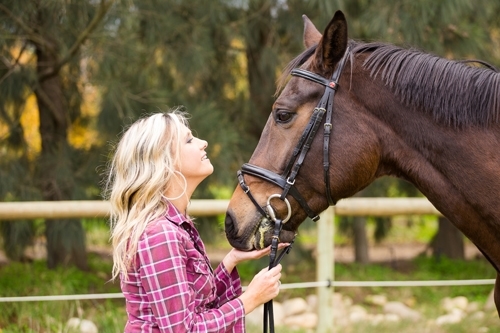An adolescent feels tremendous emotional pressure to resolve childhood ideals while still attempting to become an adult. The job of the adolescent seems to be a reconciliation between “the person one has come to be” and “the person society expects one to become,” according to Erikson. Complicating matters are puberty, peer pressure, social media, family issues, addictions or issues related to self-esteem or mental health.
Eating disorders may have a genetic underpinning, but an adolescent often begins to use food for the purpose of managing anxiety or depression that accompanies outside forces. However, if this stage of development includes finding a new identity while letting an outdated one go away, where can a young adult practice trying on new identities without negative repercussions?
One “stage” on which to practice new skills and to work out complicated feelings may be found in a therapeutic horse and barn setting. Equine-Assisted Psychotherapy (EAP) is a specialized form of psychotherapy where the horse is utilized as a therapeutic resource, therapist and teacher. Facilitated with both therapist and horse handler, EAP is designed to address self-esteem and personal confidence, communication and interpersonal effectiveness, trust and boundaries, as well as limit setting and group cohesion.
EAP also allows for self-directed accomplishments, which is important for improving decision-making skills, developing value system beliefs and encouraging self-esteem. Body image issues can be facilitated through the function of moving with the horse, grooming the horse, and noticing the horse’s movement.
A study (Trotter, Chandler, Goodwin-Bond, & Casey, 2008) conducted with 164 adolescent students identified as high risk for social or behavioral failure, participated in 12 weekly sessions comparing the benefits of equine assisted counseling to school based counseling. The students who participated in equine assisted counseling showed statistically significant improvements in 17 behavior areas such as hyperactivity, aggression, anxiety, adaptability and social skills. In contrast, those who received only classroom-style counseling made improvements in five areas, including social stress, self-esteem and depression. Furthermore, continued and repeated evaluations confirmed the equine assisted counseling participants showed steady progress in positive behaviors and a decrease in negative behaviors.
In an 18-month study conducted from 2003-2005 (Schultz, Remick-Barlow, & Robbins, 2007), 63 physically abused and non-abused children participated in an Equine Assisted Therapy study. Each child’s pre- and post-Global Assessment of Functioning (GAF) was evaluated since the GAF is a universal marker of mental health functioning. All children showed improved GAF, but there was a marked correlation to the percentage of improvement and the number of Equine Assisted Therapy sessions. In fact, the GAF was even stronger for the children from violent backgrounds.
“Given the right conditions, and having enough space and time to experiment and explore, an adolescent may emerge with a firm sense of identity, and emotional and deep awareness of who he or she is,” according to Erikson.
It makes sense that Equine Assisted Therapies may be the foundation for stability, if not recovery, for an adolescent struggling with issues related to an eating disorder, body image, depression and family related issues and peer pressures.
Libby Neal, MA, LPC, is in private practice on the western slope of Colorado. Specializing in eating disorders and trauma, Libby utilizes psychodynamic therapy, evidence-based practices, equine assisted therapy and art therapy. Libby has fifteen years of experience with eating disorders working as a clinician, administrator and educator.

